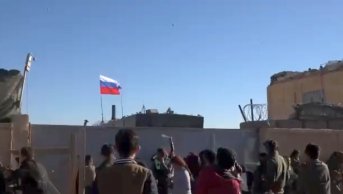Who in Middle East Used Gezi Park Protests as Opportunity?

The protests which started after a number of trees were cut down as part of the Taksim Pedestrianization Project in İstanbul quickly spread across Turkey, but in particular İstanbul, Ankara and İzmir.
The protests, which began as a sit-in by civil activists around İstanbul's Taksim Square, evolved into anti-government demonstrations in due course. The Gezi Park protests quickly drew the close attention of the world, and heads of state as well as prime ministers of other countries made official statements regarding the protests in Turkey. The world press, too, has closely followed the developments.
Both the statements and perception and reaction of media organizations towards the Gezi Park protests have been directly affected by the relations of that particular country with Turkey. In addition to consequences in terms of Turkish domestic politics, the protests have had concrete impacts also on Turkish foreign policy, Turkey's relations with the US and EU, and the countries in the region, as well as on Turkey's position and prestige in the international arena.
It may be that the aforementioned impact has been observed most in terms of Turkey's role as a “model country” in the Middle East. Furthermore, due to the fact that Turkey has been pursuing an active foreign policy in the Middle East for the last decade, has taken a stance on the democratization process in the Middle East widely known as the Arab Spring, and has been one of the countries intervening in the Syrian civil war, the Gezi Park protests set off a process that led to questioning Turkey's regional position.
As opposed to a well-intended questioning approach, the Gezi Park protests have been seen as an opportunity by actors uncomfortable with Turkey's Syria policy. We can see that there is an analogy between those actors and the countries criticizing the Justice and Development Party (AK Party) government over the Gezi Park protests.
Iran, Syria, Lebanon's Hezbollah and Iraq's Maliki administration are strongly against the policy Turkey is pursuing in Syria. All four actors have considered the Gezi Park protests an opportunity to weaken Turkey's regional position and to question the legitimacy of Turkey's 10-year Middle East policy. A few things in common in the approach of the officials from these four countries and the media are: using the expression “popular uprising” for the Gezi Park protests; highlighting the excessive use of force against demonstrators; and asserting that Turkey lost the chance of being a model country. They also worked hard to make the level of democracy in Turkey be questioned, and to put a question mark in the minds of people when it comes to Turkey exporting democracy to the region.
Accusing Turkey of meddling in Syria's domestic affairs, those countries used the Gezi Park protests as an opportunity to push Turkey into a legitimacy crisis in terms of its foreign policy, to show the legitimacy of their own position, and to weaken Turkey. This was most clearly seen in the reactions of the Syrian regime.
An attempt was made to make the protests in Turkey look like the conflict in Syria and, to this end, Syria reacted in its level of discourse in a way that mirrored Turkey's attitude towards Syria. Syrian leader Bashar al-Assad accused the “Turkish government” of using violence against protesters staging peaceful protests for Gezi Park, and footage showing police firing water cannon and tear gas as well as attacking protesters was played on Syrian TV channels for hours.
One of the most interesting reactions came from the Syrian Foreign Ministry, which advised Syrian citizens “against traveling to Turkey on safety grounds,” despite the complete difference between the events in Syria and Turkey in terms of the content and level of violence. By doing so, Syria wanted to counteract in response to the earlier reaction of Turkey, and tried to exaggerate the situation in Turkey.
All these approaches seem to be Syrian efforts to draw an analogy between what has been happening in Turkey and Syria, and to “take revenge” from the Turkish government at the earliest opportunity.
Iran, on the other hand, seems to have adopted a more diplomatic approach towards Turkey, but it, too, has been trying to get Turkey's Syria policy to be questioned. Regarding the Gezi Park protests, Iranian Foreign Ministry spokesman Abbas Araghchi said the protests are an internal matter for Turkey to resolve but expressed hope that the issue would be resolved in a peaceful manner with prudence shown by Turkish leaders.
Although at the first glance this seems to be a statement in support of Turkey, it has been understood that Iran directly associated the Gezi Park protests with the events in Syria. The fact that Iran said the protests are an “internal matter” is a message for Turkey that it has no right to intervene in the internal affairs of Syria.
On the other hand, Iran expressing its “hope that the issue will be resolved in a peaceful manner” might be interpreted as criticism of attempts to topple the Assad regime via a military solution in Syria. All in all, Iran tries to show that it has been pursuing a consistent Syria policy without exerting pressure on the Turkish government for the protests.
In Lebanon, pro-Hezbollah and pro-Assad newspapers tried to portray the protests in Turkey as the “failure of the Turkish model.” They also drew analogies between Turkey/Egypt and Erdoğan/Morsi, and criticized the Turkish government over the Gezi Park protests.
According to those newspapers, in both Turkey and Egypt, democracy is limited with 50 percent of the vote received by the ruling parties, both governments are based on investments and the power of generating employment, leaders have pursued policies that conflict with the cultural values of a considerable part of society, there have been attempts to eliminate all symbols adopted by secular circles, and both ruling parties have been taking advantage of the weakness of opposition parties.
The pro-Hezbollah media defined the Gezi Park protests as a popular uprising, and criticized the Turkish government for using excessive force by asserting that “it can once again be understood that it is highly unlikely for any government to resist the popular will.”
In a column published by Al Akhbar, known for its affiliation with Hezbollah, the Gezi Park protests were described as a “Turkish Spring.” They tried to give the impression that there is no democracy in Turkey and that the people revolted against a dictator by drawing an analogy with the “Arab Spring.” Accordingly, “the stable economy of Turkey should not prevent the situation from being described as a Turkish Spring. For instance, the economic stability in Tunisia which went through the Arab Spring was better than Turkey.”
According to this point of view, “the AK Party government is a threat to Turkey's cultural structure and that is why the protesters have been gathering in Taksim Square. The people are trying to say 'stop' to Erdoğan, who has been trying to impose the Ottoman ideology.”
As for Iraq, pro-government media assessed the protests as a new challenge after Erdoğan's struggle with the Turkish army. They asserted that “the Turkish prime minister, who won out over the army and external powers, might have to leave power in the face of the youth.” An article published in an Iraqi newspaper, Al Mada, asserts that “the Gezi Park protests are a historical crossroads for Turkey. The demonstrations might take the country back to the Ottoman period, or lead Turkey to a liberal democracy. The current conflict stems from Erdoğan's extremist and oppressive policies.”
As another dynamic of the conflicts, the Iraqi media put forth the rivalry between the secular middle class, upper-middle class and those migrating from rural to urban areas and supporting the prime minister, and underlined that Prime Minister Erdoğan had begun to follow an increasingly conservative policy.
The demonstrations were also regarded as a reflection of a recent increase in reactions from Turkey's Alevis, who comprise 15 percent of the population, against the government. The media in Iraq suggested that “while the peace process with the Kurds is negatively affecting Alevis, the plans to name the third bridge to be built over the Bosporus in İstanbul the Yavuz Sultan Selim Bridge also provoked the Alevis.”
Furthermore, a column published in a newspaper that supports the Nouri al-Maliki government, which Turkey has problematic relations with, describes the protests in Turkey as the “Turkish Spring and Autumn for Erdoğan.” A column in this newspaper states that “the government has been restricting freedoms by taking the 'Muslim Brotherhood' as a model, and people from all circles have been taking part in the uprising, described as the 'uprising of looters'.”
Also, a news portal known for its close ties to the Maliki government published a column titled “The Spell Broken! Turkey's Waiting for Spring.” This column said that “the interventionist policy Turkey has been following in recent years has backfired.” According to the columnist, “Turkey has never had mutual stable relations based on respect with any Arab country, and Turkey has never shown respect for the sovereignty of Arab countries either. Like some other countries, Turkey has intervened in Iraq's domestic affairs and has directly been involved in the Arab Spring process.”
Arguing that the process has been reversed, the columnist asserted that the “Turkish government intervened in the peaceful protests without respecting human rights” and that “it was time for Arabs to teach democracy to Turkey, which has been giving democracy lessons to the region for years.”
The official statements from Iraq also point out the problematic relations between the two countries. The Maliki government has been accusing Turkey of intervening in its internal affairs, and the Iraqi prime minister criticized the Turkish government by highlighting that the “Gezi Park protests spread throughout Turkey because of the violence used on protesters” and that “the government should not use violence on protesters.”










